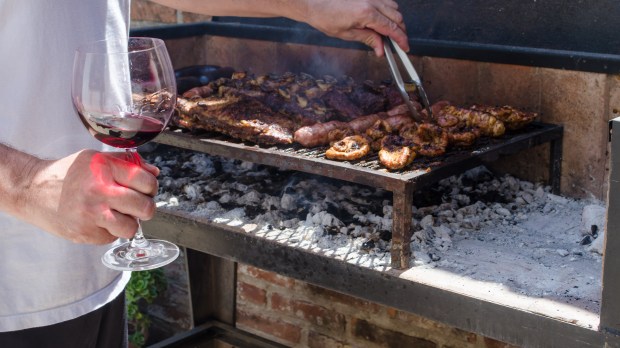Last Sunday, an Argentinian friend invited me to an asado. No way on earth I was going to say no to that – even if we had to take the train for a bit more than an hour. If you have never been to an Argentine asado, you have been missing out on something big. And I don’t (exclusively) mean the many different cuts of prime Argentine beef, blood sausages, chorizo, provoleta, and vegetables sizzling on the grill in the backyard. I am not (just) thinking of the generously poured Argentine Malbec one needs to wash it all down.
What sticks in my memory is the warm laughter echoing with each toast, and the sun setting on a day filled with healthy camaraderie. Of course, this was not just any gathering: It was our way of saying goodbye to the boisterous spirit of Carnival before the introspective calm of Lent sets in. The word “carnival” itself whispers of this transition, possibly derived from the Latin carne levare, meaning “to remove meat,” “to take the meat away,” as if marking the last hurrah before Lent.
What may surprise you is that despite seven (7!) hours of feasting, music, and wine, there was no excess – and certainly no hangover. What we all left with was, instead, a shared sense of joyful moderation. Obviously, if you are expected to stay until the asado ends, you have to pace yourself all throughout the day. In more ways than one, the asado is a celebration of moderation, a powerful reminder of the value of temperance – a virtue often overlooked in a world seemingly driven by an overabundance of goods (for the lucky few).
Greeks got it
The Greeks had a word for this delicate balance: sophrosyne. As usual, it’s a hard one to translate. It encompassed more than just moderation; it was a state of self-awareness, wisdom, and balance in all aspects of life. Philosophers like Aristotle saw sophrosyne (and its twin sister, prudence) as the keystone of all virtues, the guiding principle that prevented excess and fostered harmony.
A proper asado unfolds (as any family meeting should) in this very spirit. Each dish, each sip, was savored for its quality, not its quantity. Or perhaps not even because of its quality (which, yes, was exceptional), but because it was an excuse to gather friends and family together away from screens in a shared, open-air activity. Conversation flowed freely, fueled by genuine connection – rather than intoxication. The focus was on the shared experience, the company, the joy of being present. This mindful practice of moderation allowed us to indulge without losing ourselves, to celebrate without succumbing to excess.
Not deprivation, but choice
The beauty of moderation is not in deprivation, but in conscious choice. This is, in more ways than one, the key to a fruitful Lent.
It is a matter of discipline, but also of respect and love for self and others. If anything, moderation is about knowing, understanding, and respecting our limits, appreciating the intrinsic value of things rather than seeking fleeting pleasures.
The asado is a perfect example of this. Instead of mindless consumption, we engaged in mindful appreciation, celebrating life’s simple pleasures with gratitude – even more so, we learned to appreciate time spent together with our friends, their kids, ours, and the friends of their friends.
This mindful moderation extends to all aspects of life. When we cultivate moderation, we make room for other virtues to flourish. We develop self-control, avoiding impulsive decisions that could harm ourselves or others. We cultivate patience, knowing that true satisfaction comes from (sorry for the cliché) enjoying the journey, not just the destination. And we cultivate generosity, understanding that true joy comes from sharing, not from accumulating.
So as the ashes of the asado settled, we carried with us a sense of contentment, knowing that we had celebrated both Carnival and our connection to loved ones through mindful enjoyment. The ancient Greek concept of sophrosyne, revived in the warm glow of an Argentine evening, offered a timeless path to a life enriched by connection, joy, and balance.
It was a fitting preparation for Lent: a reminder that true joy is most of the time the result of wise moderation, not of succumbing to fleeting excess. After all, isn’t that how we build lasting memories?



